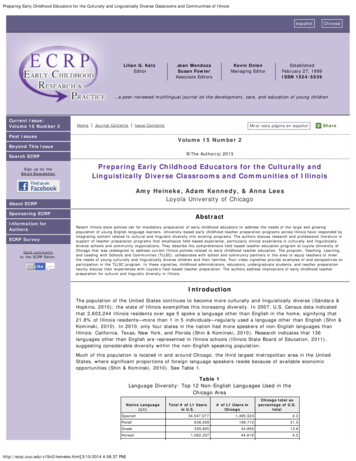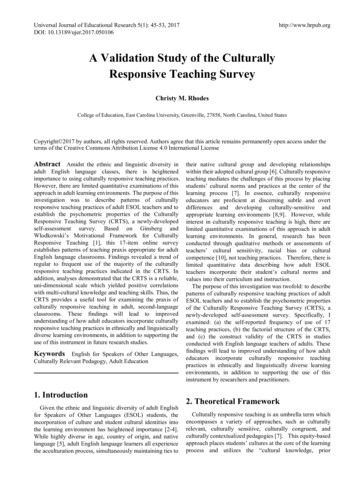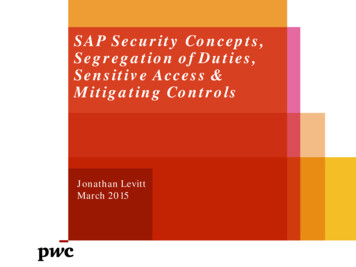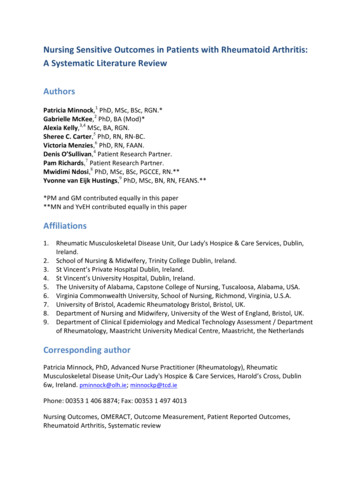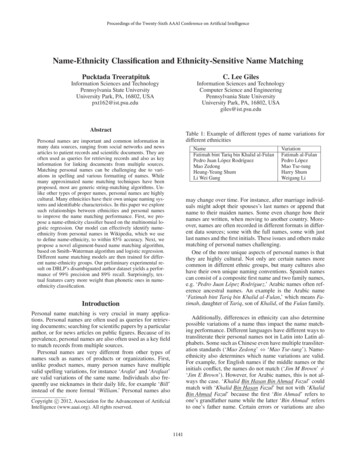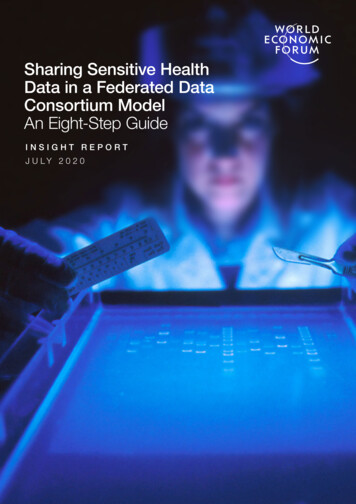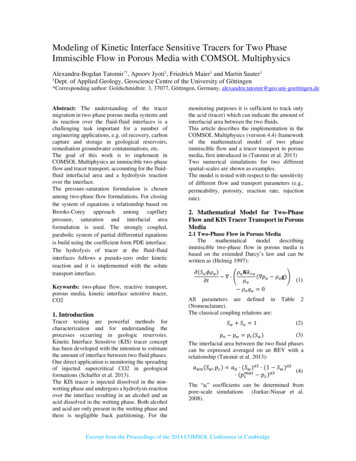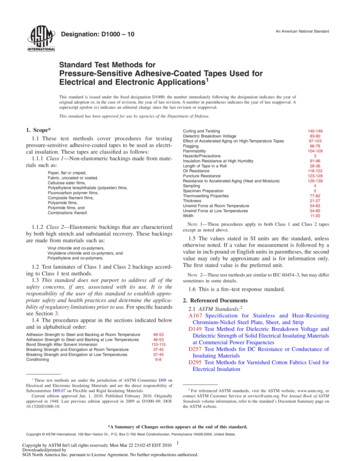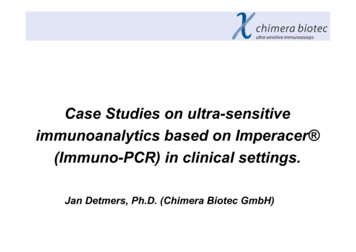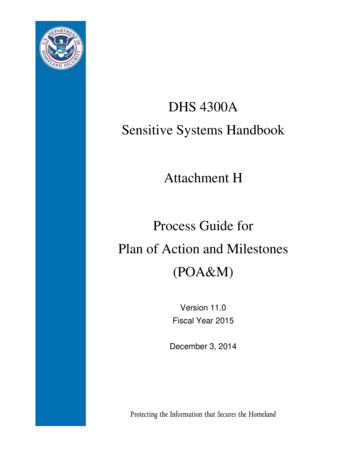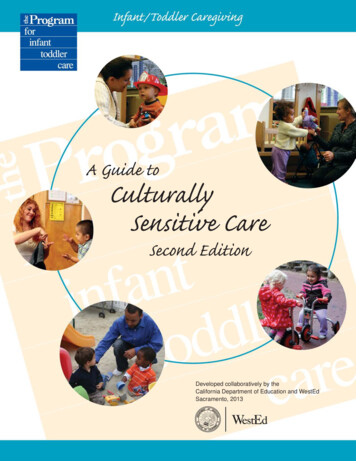
Transcription
A Guide toCulturallySensitive CareSecond EditionDeveloped collaboratively by theCalifornia Department of Education and WestEdSacramento, 2013WestEd
Infant/Toddler CaregivingA Guide toCulturallySensitive CareSecond EditionEdited byElita Amini Virmani and Peter L. MangioneDeveloped collaboratively by theCalifornia Department of Educationand WestEd
Publishing InformationInfant/Toddler Caregiving: A Guide to Culturally Sensitive Care, Second Edition,was developed by WestEd, San Francisco. The publication was edited by Faye Ong,working in cooperation with Elita Amini Virmani and Peter Mangione, WestEd; andSy Dang Nguyen, Consultant, Child Development Division, California Depart ment of Education (CDE). It was prepared for printing by the staff of CDE Press,with the cover and interior design created by Juan D. Sanchez. The document waspublished by the California Department of Education, 1430 N Street, Sacramento,CA 95814-5901. It was distributed under the provisions of the Library DistributionAct and Government Code Section 11096. 2013 by the California Department of EducationFirst edition printed in 1995; reprinted in 2010.All rights reservedISBN 978-0-8011-1734-3Ordering InformationCopies of this publication are available for purchase from the California Depart ment of Education (CDE). For prices and ordering information, visit http://www.cde.ca.gov/re/pn/rc/ or call the CDE Press sales office at 1-800-995-4099.NoticeThe guidance in Infant/Toddler Caregiving: A Guide to Culturally Sensitive Care,Second Edition, is not binding on local educational agencies or other entities. Ex cept for statutes, regulations, and court decisions referenced herein, the document isexemplary, and compliance with it is not mandatory. (See Education Code Section33308.5.)Prepared for printingby CSEA membersii
ContentsA Message from the State Superintendent of Public InstructionAcknowledgments viiAbout the Authors xIntroduction xiviSection One: Understanding the Social Context of Infant/Toddler CareChapter 1. Culture and Identity Development: Getting Infants andToddlers Off to a Great Start 2Carol Brunson DayThe Beginnings of Identity Development Are in Infancy 2Dimensions of Identity Development 3The Role of Culture in Development 4Cultural Empowerment: Preparing Infant/Toddler Care Teachers forCompetent Practice 5Culture as a Process 6Culturally Responsive Practices That Support Identity DevelopmentReferences 1018Chapter 2. Prejudice, Bias, and Inequity in the Lives of Infants and Toddlers 13Louise Derman-SparksSocietal Inequity and Families 14What Infants and Toddlers See and Hear in Child Care Settings 14Socialization in Two Cultures 16Practicing Culturally Responsive Care 17Building Blocks of a Culturally Responsive Care/Learning Environment 19Conclusion 22Glossary 23References 24Chapter 3. Inclusion of Children with Special Needs in Diverse EarlyCare Settings 25Deborah ChenDiverse Perspectives on Disability 25Differences in Perspectives 27Understanding Early Intervention Terminology, Eligibility, and InterventionEligibility for Early Intervention Services 28Initiating the Early Intervention Process: Making Referrals 29iii28
Individualized Family Service Plan 33Teaming with Interpreters 33Gathering Information from Families 34Sharing Information with Families 36Supporting Participation and a Sense of Belonging in the Early Care SettingPerson-First Language 37Universal Design for Learning 37Teaming with Early Intervention Service Providers 38Embedding Specific Learning Opportunities in Daily Routines 38Questions to Guide Practice 39Conclusion 39References 4036Section Two: Becoming Informed About Cultural Practices and CulturalCommunities 41Chapter 4. A Cultural Communities and Cultural Practices Approach toUnderstanding Infant and Toddler Care 42Alison Wishard Guerra and Sarah GarrityParticipation in Cultural Practices at Home and in the Early Care Setting 44Understanding Cultural Communities 45Understanding Cultural Practices 47Families and Communities 47Interactions with Children and Families and Becoming Informed About CulturalPractices and Cultural Communities 51Understanding the Classroom or Program as Its Own Cultural Community 52References 53Chapter 5. Cultural Sensitivity in Caregiving Routines: The Essential Activitiesof Daily Living 56Janet Gonzalez-MenaDiffering Beliefs and Values 56What Is a Routine? 57Cultural Differences in Daily Routines: Toileting, Feeding,and Sleeping/Napping 58Toileting 59Feeding Practices 61Sleeping/Napping Routines 63Summary 64References 65Section Three: Creating Collaborative, Reciprocal Relationships with Families 67Chapter 6. Developing Culturally Responsive Caregiving Practices: Acknowledge,Ask, and Adapt 68Louise Derman-SparksThe Process of Culturally Responsive Care 68Acknowledge, Ask, and Adapt 72Identifying Culturally Responsive and Culturally Insensitive Practices 75iv
Scenario 1: A Baby Crying 76Scenario 2: Babies Wearing Protective Amulets 79Scenario 3: Babies Staying Clean or Engaging in Active Learning 82Scenario 4: “Two Mommies” 84Developmental Issues or Cultural Differences? 86Determining the Nature of the Behavior 86Conclusion 88References 88Thinking/Doing Activity 1 89Thinking/Doing Activity 2 90Thinking/Doing Activity 3 91Thinking/Doing Activity 4 92Thinking/Doing Activity 5 93Thinking Doing Activity 6 94Chapter 7. Creating Collaborative, Reciprocal Relationships with LinguisticallyDiverse Families 95Gisela Jia and Alison Wishard GuerraLinguistic and Cultural Diversity at Home 95Family Beliefs and Goals for Children’s Bicultural and BilingualDevelopment 96The Importance of Developing Home Language and Cultural Competence 97Communication and Language Development in Non-English-SpeakingHomes 97Strategies for Creating Collaborative Relationships with LinguisticallyDiverse Families 98Conclusion 104References 105Section Four: Suggested Resources107v
A Message from the State Superintendentof Public InstructionCulturally responsive practices are essential to supporting children’s developmentin all domains. To address culturally responsive practices in early care settings,seven noted experts have been brought together to create this second edition of AGuide to Culturally Sensitive Care, which was developed collaboratively by theCalifornia Department of Education and WestEd. The guide focuses on understanding therole that culture and language play in contributing to children’s development and includesimportant considerations in caring for young children from diverse cultural and linguisticbackgrounds. The publication introduces readers to new ways of thinking about cultureand its impact on child development. It suggests ways for teachers to collaborate withfamilies to better understand how family goals and values influence their daily caregiv ing practices and routines. In addition, the book aims to help infant/toddler care teachersdeepen their appreciation of how they are influenced by their own cultural beliefs andhow an awareness of one’s beliefs is the foundation for being responsive to the culturalperspectives and experiences of young children and families. Above all, this resourceoffers infant/toddler care teachers many practical ideas on how to create relationshipswith families and establish meaningful connections between the home and the early caresetting.It is our hope that everyone in the infant/toddler field will use this new publicationhand in hand with the other resources created by the Department of Education to promotethe well-being and long-term development of California’s youngest children and theirfamilies.TOM TORLAKSONState Superintendent of Public Instructionvi
AcknowledgmentsThe first edition of this publication was developed by the WestEd Center forChild and Family Studies, under the direction of J. Ronald Lally. Funding forthe first edition was generously provided by the Carnegie Corporation of NewYork. Special thanks go to Jesus Cortez, Louise Derman-Sparks, Janet Gonza les-Mena, Alicia F. Lieberman, Jayanthi Mistri, Carol Brunson Day, Carol Lou YoungHolt, and Peter L. Mangione for their contributions to the first edition; to Karla Nygaardfor editorial assistance; and to Robert Cervantes, Kay Witcher, Janet Poole, VirginiaBenson, Helen Nguyen, and Mary Smithberger, Child Development Division, CaliforniaDepartment of Education, for their review of the content. Thanks are also extended tothe members of the national and the California review panels and the Advisory Panel forCulturally Sensitive Care for their comments and suggestions. The national panel mem bers were T. Berry Brazelton, Laura Dittman, Richard Fiene, Magda Gerber, Asa Hill iard, Alice Honig, Jeree Pawl, Sally Provence, Eleanor Szanton, Yolanda Torres, BerniceWeissbourd, and Donna Wittmer. The California panel members were Dorlene Clayton,Dee Cuney, Ronda Garcia, Jacquelyne Jackson, Lee McKay, Janet Nielsen, PearleneReese, Maria Ruiz, June Sale, Patty Siegel, and Lenore Thompson. The members of theculturally sensitive care panel were Ruby Burgess, Jesus Cortez, Louise Derman-Sparks,Ron Henderson, Frances E. Kendall, Christina Guzman-Pederson, Carol Brunson Day,and Yolanda Torres.For contributions to this second edition, special thanks go to Carol Brunson Day, J.Ronald Lally, Louise Derman-Sparks, Deborah Chen, Sarah Garrity, Janet GonzalesMena, Alison Wishard Guerra, Elita Amini Virmani, and Peter L. Mangione. For editorialassistance, appreciation is extended to Eva Gorman.The California Department of Education gratefully acknowledges Sara Webb Schmitzfor the use of photos that appear in this publication and Deborah Greenwald for her workin selecting the photos. Special thanks also go to the following programs: AssociatedStudents Inc. Children’s Center, California State University, Sacramento; Blue Skies forChildren; the Cameron School; Contra Costa Community College Early Learning Center;Eben Ezer Family Child Care; Little Munchkins Academy; Marin Head Start, HamiltonCampus; Marin Head Start, Indian Valley Campus; Marin Head Start, Meadow ParkCampus; and Willow Street Schoolhouse.vii
About the AuthorsCarol Brunson Day, PhD, is a native of Chicago. She holds a BA in psychologyfrom the University of Wisconsin, an MA in early childhood education from theErikson Institute, and a PhD in education from Claremont Graduate School.Throughout her career in early childhood education, Dr. Day has been involved inboth teaching young children and training teachers, at first as a Head Start teacher andinstructor of child development at Prairie State College in Illinois. For 13 years, she wasa member of the human development faculty at Pacific Oaks College in Pasadena, Cali fornia, specializing in early childhood education and cultural influences on development.From 2005 to 2010, Dr. Day was the president of the National Black Child DevelopmentInstitute after serving as the CEO and president of the Council for Professional Recogni tion from 1985 until 2004.Dr. Day received two fellowship awards: the first in 1980 from the Ford Founda tion and the National Research Council, and the second in 1981 when she was named aShaughnessy Scholar under a program by the U. S. Department of Education’s Fund forthe Improvement of Post-Secondary EducationLouise Derman-Sparks, MA, has worked for more than 50 years on issues of diver sity and social justice as a preschool teacher, child care center director, parent, collegeteacher, researcher, and activist. A native of New York City, she holds a BA degree witha major in English and a minor in history from Brooklyn College and an MA in earlyand elementary education from the University of Michigan. On the human developmentfaculty of Pacific Oaks College, Pasadena, for 33 years, she is now a professor emeritus.Louise began her career as an early childhood educator in the Perry Preschool Project andthe Ypsilanti Early Childhood Project and then directed a child care center in Los Ange les. She is the author and co-author of several books, the most recent work being AntiBias Education for Young Children & Ourselves, co-authored with Julie Olsen Edwards(2010). Other books include What If All the Kids Are White?, Anti-bias/MulticulturalEducation with Young Children and Families with Dr. Patricia Ramsey (2010), Teaching/Learning Anti-Racism: A Developmental Approach with Dr. Carol B. Phillips (1997), andAnti-Bias Curriculum: Tools for Empowering Young Children, with the A.B.C. Task Force(1989).Ms. Derman-Sparks speaks, conducts workshops, and consults widely throughout theUnited States and internationally. A former member of the governing board of the Nation al Association for the Education of Young Children, she currently works with Crossroads,an anti-racism training organization, and has been a social justice activist for 50 years.Ms. Derman-Sparks is also the mother of two children, Douglass and Holly Sparks.viii
Deborah Chen, PhD, is a professor in the Department of Special Education at Cali fornia State University, Northridge. Dr. Chen coordinates the Early Childhood SpecialEducation credential program and teaches courses in this area. She has been an earlyinterventionist; special educator; and administrator of programs for children with avariety of learning needs, severe and multiple disabilities, and sensory impairments. Dr.Chen’s research, publications, and materials focus on the following areas: interdisciplin ary perspectives in early intervention; communication with infants and young childrenwho have multiple disabilities, visual impairments, and who are deaf-blind; and cultur ally responsive services to young children and families of diverse cultural and linguisticbackgrounds. She has presented at statewide, national, and international conferences andhas conducted professional development courses and workshops throughout the UnitedStates and internationally.Alison Wishard Guerra, PhD, is an assistant professor in the department of educa tion studies at the University of California, San Diego (UCSD). She received her PhD ineducation from the University of California, Los Angeles, in 2005, with an emphasis onpsychological studies in education. Dr. Wishard Guerra’s research focuses on culture anddevelopment in early childhood, with a particular focus on social and language develop ment among Latino children from low-income families. Her research looks specifically athow social relationships and interactions may serve as protective factors for later cogni tive development among at-risk children. She studies within-group variations relatedto immigration and acculturation experiences and their associations with children’sdevelopmental outcomes. Dr. Wishard Guerra is a member of the National Early HeadStart Research Consortium, where she continues research investigating social and cogni tive developmental outcomes. Within the consortium she leads a team to investigate thelinks between stability and continuity in early child care experiences and developmentaloutcomes of 3,000 children, from birth to three years old, participating in the Early HeadStart National Research Project.Dr. Wishard Guerra was a member of the expanded research consortia that devel oped the California Preschool Learning Foundations on English-language development,and she has served as an expert reviewer of English-language development and culturaldiversity in the development of volumes 2 (Visual and Performing Arts, Physical De velopment, and Health) and 3 (History–Social Science and Science) of the CaliforniaPreschool Learning Foundations and the California Preschool Curriculum Framework,published by the California Department of Education. Her current research at UCSDinvestigates the role of social pretend play in the development of oral language and schoolreadiness among Mexican-heritage children. In the education studies department, sheteaches courses on early childhood education; culture and developmental theory; quanti tative research methodology; a dissertation-writing seminar; and research on curriculumdesign. Dr. Wishard Guerra is a 2009–10 Hellman Foundation Fellow and the recipientof a 2009–10 and 2011–12 University–Community (UC) Links grants. UC Links is anetwork of educational programs that connect community and university partners work ing together to create innovative after-school programs.Sarah Garrity, EdD, received an MS in child and family development from SanDiego State University and an EdD in educational leadership through a joint doctoralprogram offered by the University of California, San Diego, and California State Univer ix
sity, San Marcos. She has been a practitioner in the field of early childhood education foralmost 20 years as a teacher, administrator, and literacy coach. In her role as a Head Startadministrator, she was responsible for implementation of Early Head Start and state-fund ed infant/toddler programs. Currently, she is an assistant professor in the Department ofChild and Family Development at San Diego State University, where she teaches coursesin early childhood education and for the department’s early childhood mental healthcertificate program. Dr. Garrity’s research focuses on using mixed methods and researchtechniques to learn more about the complexities of educational settings, particularly thecultural and linguistic origins of teacher practices and how they impact children’s ex periences and outcomes. Her research is committed to improving outcomes for at-riskchildren and closing the school-readiness gap through the use of classroom practices thatare based on evidence and are meaningful and culturally relevant to both teachers andstudents.Janet Gonzalez-Mena, MA, retired from working as a full-time faculty member inthe child and family studies program at Napa Valley College and now is a self-employedconsultant specializing in infants and toddlers, diversity, and partnerships with families.She was formerly director of child care services for a family service agency in San MateoCounty. The agency’s services included an infant/toddler center, a network of family childcare homes, and a program of therapeutic child care for abused and neglected infants,toddlers, and preschoolers. She worked in Head Start as a teacher (when it first began)and later as a Head Start trainer. Her career includes being a home visitor in a bilingualprogram for Spanish-speaking children and their families. Ms. Gonzalez-Mena is the co author of Infants, Toddlers, and Caregivers: A Curriculum of Respectful, Responsive Careand Education and the author of Infant/Toddler Caregiving: A Guide to Routines. Shealso wrote Diversity in Early Care and Education: Honoring Differences. She has writtenmany articles about infants and toddlers, diversity, and parenting for periodicals, includ ing Young Children and Exchange Magazine. She has a multiethnic, multiracial family.Gisela Jia, PhD, is currently an associate professor in the department of psychology atLehman College, City University of New York. She received her BA in English languageand literature and her MA in linguistics from Beijing University and her doctorate indevelopmental and cognitive psychology from New York University. Throughout the past17 years, she has conducted research in bilingual language development among first- andsecond-generation immigrants speaking Mandarin, Cantonese, Korean, Russian, or Span ish as their home language. Her work has been published in many professional journals,books, and proceedings read by psychologists, linguists, educators, and speech/languagepathologists. Dr. Jia has involved many graduate and undergraduate students, as well ashigh school students, with multicultural and multilingual backgrounds in her research.She has served as a consultant for the California Department of Education to developlanguage learning standards for bilingual children.x
IntroductionAs early education programs strive to promote development for all children, thosefrom diverse cultures as well as those f
Erikson Institute, and a PhD in education from Claremont Graduate School. Throughout her career in early childhood education, Dr. Day has been involved in both teaching young children a

